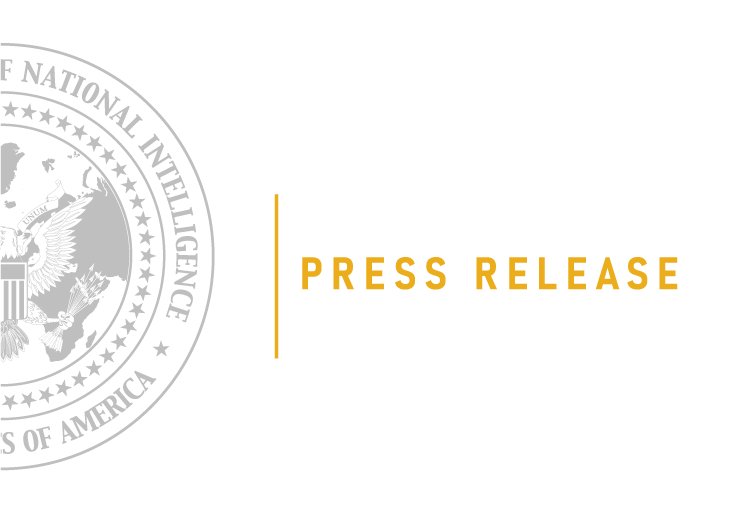FOR IMMEDIATE RELEASE ODNI News Release No. 05-13
April 5, 2013
Director of National Intelligence Issues New Security Clearance Guidance
Guidance will support victims of sexual assault who have consulted with a health care professional
Director of National Intelligence James R. Clapper today issued new guidance to support victims of sexual assault who hold or wish to hold a government security clearance, but may be reluctant to seek mental health counseling for fear they may have to disclose the counseling on their application.
The guidance which was issued on an interim basis pending formal revision of the policy, applies to all executive branch departments and agencies.
“I believe that this interim policy guidance will positively impact national security,” said Director Clapper. “The U.S. Government recognizes the critical importance of mental health and supports proactive management of mental health conditions, wellness and recovery.”
The interim guidance allows victims of sexual assault to answer “No” to Question 21 on the Standard Form 86, “Questionnaire for National Security Positions”, which asks if you have in the last seven years consulted a health care professional regarding an emotional or mental health condition or if you were similarly hospitalized. Previously, the only exemptions were for family, grief and marital counseling unrelated to violence, and counseling for post-military combat service.
The following language will be added to Question 21:
"Please respond to this question with the following additional instruction: Victims of sexual assault who have consulted with a health care professional regarding an emotional or mental health condition during this period strictly in relation to the sexual assault are instructed to answer No."
Director Clapper’s decision to add the exemption came after a comprehensive review, in consultation with the members of Congress, Department of Defense, other Federal agencies and with victim advocacy groups. He issued the interim guidance now in the interest of encouraging victims of sexual assault to seek the mental health services they may need instead of waiting for the formal revision of the questionnaire, which is a potentially lengthy process that includes publishing any proposed changes in the Federal Register.
“I would like to thank Senator Tester, Congresswoman Pingree and Congresswoman Tsongas for their oversight and support of victims of sexual assault who may benefit from mental health treatment, but may not have otherwise sought treatment out of concern for their career or security clearance,” said Director Clapper. “I would also like to thank the Office of the Vice President, our colleagues in the Department of Defense, Office of Personnel Management, and Office of Management and Budget for their critical support in making this change
“Equally important,” he added, “is the support of the Service Women's Action Network (SWAN) and Protect our Defenders whose advocacy on behalf of victims of sexual assault was integral in the process. Through our combined efforts victims of sexual assault will be encouraged to seek the mental health services they may need while feeling safe that their privacy protections are strictly enforced.”
The interim guidance also reaffirms that an individual’s decision to seek mental health care alone cannot adversely impact the individual’s ability to obtain or maintain eligibility to hold a national security sensitive position or eligibility for access to classified information. Further, mental health counseling alone cannot form the basis of a denial of a security clearance. The decision to seek personal wellness and recovery should not be perceived to jeopardize an individual’s security clearance and may favorably affect a person’s eligibility determination.
Individuals who do answer “Yes” to Question 21, are protected by limitations on the scope of questions that background investigators may ask health care practitioners in determining whether the individual has a condition that could impair his/her judgment, reliability, or ability to properly safeguard classified information. These protections apply to all types of mental health counseling. Officials such as security managers, commanders, supervisors, and human resource personnel are prohibited from asking individuals for additional information regarding any mental health counseling they may include on the questionnaire.
DNI Clapper’s interim guidance also reaffirms:
- Strict enforcement of an individual’s privacy protections. Everyone involved in the personnel security process, including the individual completing the questionnaire, must be fully aware of the guidance and the specific protections it affords individuals.
- All information pertaining to mental health treatment shall be handled on a strict need-to-know basis. Any misuse of the information by investigators, adjudicators, supervisors, or other personnel is punishable under applicable regulations, policies, and privacy laws.
- Improper questions about an individual’s mental health counseling may result in administrative or other appropriate disciplinary action.
The interim guidance also instructs all agencies to ensure that all personnel are trained specifically on the contents of the policy. It asserts that unauthorized questioning or denial of a security clearance based solely upon mental health counseling would be inconsistent with the interim policy guidance.
Director Clapper issued the interim guidance under his authority in Executive Order 13467 as the Security Executive Agent. The EO provides the DNI with oversight authority for background investigations and making determinations of eligibility for access to classified information or eligibility to hold a sensitive position made by any agency in the executive branch.
The Director of National Intelligence leads intelligence integration across the 17 federal organizations that comprise the Intelligence Community. The DNI serves as the principal adviser to the president and the National Security Council on intelligence issues related to national security. The DNI also manages the implementation of the National Intelligence Program.





